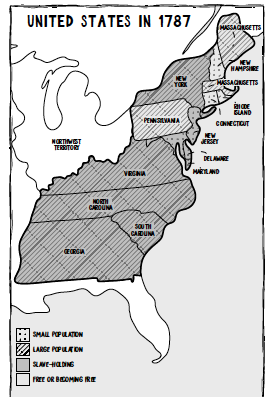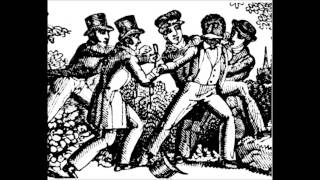Conflicts and Compromises
Imagine that your teacher tells you to write a report about octopuses without using the word “octopus.” Um. “Eight-tentacled sea creature?” “Multiarmed mollusk?” “Soft-bodied cephalopod?” The assignment quickly becomes complicated and confusing.

That’s a conundrum similar to the one the Framers created when they were writing the Constitution. One of the central issues they dealt with was slavery—the ownership of some people by other people—yet they were too squeamish to use the word in the document itself. They concocted polite terms–“other persons” and “person held to service or labour.” Representatives from southern states at the Constitutional Convention wanted to maintain the institution of slavery; some of the northerners preferred to eliminate it. This conflict led to compromises that determined the structure of our government. And the results of those compromises remain as part of our governmental system to this day.
We refer to the significance of slavery during the debates in 1787 throughout several chapters of Fault Lines in the Constitution. In this post, we’d like to bring the strands together. Slavery influenced the Constitution in four particular areas.
- The House of Representatives
Shortly after convening in Philadelphia, the Framers agreed that the government they were creating should have two houses. The number of members from each state in the lower one, the House of Representatives, would depend on the population in each state. That seemed straightforward, except that some states contained not only free citizens but also enslaved people. Other states did not.
Those states that did wanted every slave counted because that would increase their population and, therefore, the number of representatives they could send to the new Congress. Framers from states opposed to slaveholding objected to including the enslaved in the total population. After all, slaves wouldn’t be able to vote, so why should they be counted?
Of course, children and women in most states couldn’t vote either. However, the Framers presumed that fathers and husbands would represent the best interests of their families. No one claimed that slaveowners would consider anyone but themselves when voting. So why should their property be counted?
It was a northerner, James Wilson of Pennsylvania, who proposed the compromise that was accepted. Slaveholding states would be allowed to boost the size of their population by adding three-fifths of those people who were enslaved to the total of those who were free. As a result, until the outbreak of the Civil War, southern states got significantly more representatives in the House than they would have had slaves not been counted at all.
- The Electoral College
The Electoral College officially votes for the president of the United States. The number of electors in every state is a sum of its senators (two) plus the number of its representatives in the House. Since the number of representatives is based on a state’s population, slaveholding states got more electors as well. If it weren’t for this agreement, Thomas Jefferson, a slaveholder from Virginia, would not have been elected president in 1800.
- Fugitive Slave Clause

The Framers added a provision to the Constitution that required non-slave states to return runaway enslaved people—referred to as a “Person held to Service or Labour”—to their owners in other states. In this way, even those Framers who opposed the institution of slavery agreed that free states had a duty to enforce it.
- Slave Trade
Just weeks before the Framers finished their work, John Rutledge, a delegate from South Carolina, proposed that the Constitution should ban the federal government from limiting the importation of slaves from Africa to America. This source of human property was so important to slaveholding states that South Carolina and Georgia threatened to abandon the Convention, leaving a national constitution in doubt.
Again, a compromise was reached. The Atlantic slave trade would be allowed to continue—and, therefore, slavery itself could flourish—for another twenty years. During that time, about 200,000 people bound for enslavement were transported across the ocean. That was only about 50,000 fewer than all of the humans imported to America for this purpose during the previous 170 years.
The Residue of Slavery in the Constitution
The compromises the Framers made over slavery spread like tentacles throughout the Constitution. When we look at them all together like this, it’s easier to see how the issue was a motivating force behind the document.
In 1808, the Atlantic slave trade was prohibited. The Civil War did away with the Fugitive Slave Clause, and the Thirteenth Amendment ended legal human ownership in America. So, the practice of slavery is no longer legalized in the Constitution.
Nevertheless, the Electoral College, with all of the flaws that we discuss in Fault Lines, remains. So does the House of Representatives. The Framers had several reasons for establishing both of these institutions. We should not forget that the institution of slavery was one of them.

Sanford and Cynthia, could you weigh in on this perspective? It is floating around Facebook, and I’m curious on your take on the linkage the author creates between slavery and the second amendment. It’s a site that often gets labeled on the left, so I’m curious as to your perspective on its balance. Thanks! https://www.rawstory.com/2018/02/second-amendment-ratified-preserve-slavery/
LikeLike
Most enlightening. Thank you!
LikeLiked by 1 person
On the other hand, if it had not been for he Electoral College then smaller states such as Rhode Island and Delaware would refuse to join the union in the first place since their smaller voices would be undermined by a simple majority rule.
LikeLiked by 1 person
That’s true.
LikeLike
At the Constitutional Convention the slave states were able to lock-in protection for slavery. There very well have resulted no Constitution but for various compromises. Contrast with with the 2017 Trump/GOP tax law that obviously took aim at “punishing” bicoastal Blue States with certain provisions. Alas, there were no compromises with the 2017 Act as the GOP controlled Congress and the Executive. If there been no compromises back in 1787, at least the Articles of Confederation were in place. And post-1787 there were further compromises prior to the Civil War. One can speculate on how America might have fared under the Articles if there had been a failure to compromise on a matter of morality. Under the Articles, America may have been unable to survive efforts of foreign powers, including thwarting of Manifest Destiny. America’s “original sin” should not doom America’ future. Discussions of truth and reconciliation must continue.
LikeLiked by 1 person
Interesting points, Shag. We’re considering posting a blog in which we ask readers to decide whether they would sign the Constitution with these slave-related compromises.
LikeLike